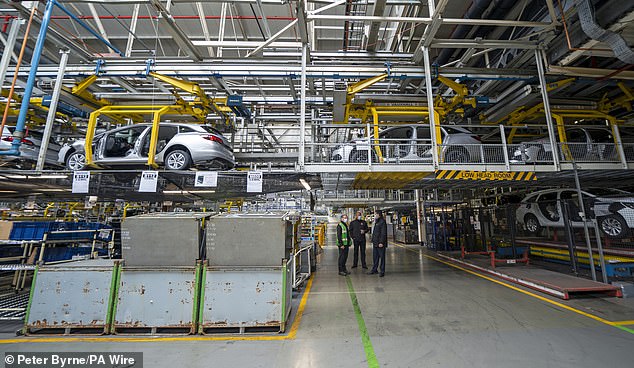- Input costs rise and orders fall as economists warn of ‘lost decade’ for sector
British manufacturing firms cut staff headcount for the 10th consecutive month in August as the embattled sector shouldered higher costs and a fall in new orders.
Rumours of further tax increases in Chancellor Rachel Reeves’ upcoming Autumn Budget were also hitting confidence in the sector, analysts said.
Closely-watched data from S&P Global Intelligence published on Monday showed factory headcounts suffering one of their greatest declines since the pandemic last month as input costs hit their highest level since May.
Lower employment was blamed on ‘weaker intakes of new work, tariff uncertainties and rising labour costs’, with bosses highlighting the impact of minimum wage and employer national insurance contributions hikes introduced earlier this year.
The S&P Global UK Manufacturing Purchasing Managers’ Index registered at 47 in August, down from July’s six-month high of 48 and below the ‘neutral’ 50 mark for the 11th month in a row.
It came as new orders contracted at the fastest pace in four months and ‘to one of the greatest extents seen over the past two years’, S&P said, citing ‘subdued client confidence’, trade tariff issues and ‘cost caution’ related to higher labour costs.

Layoffs: Factory job losses rise as pressure rises on manufacturing sector
The report found production levels showed ‘comparative resilience’ against a ‘tough operating environment’, while business confidence among manufacturers lifted to a six-month high ‘reflecting hopes that the trading environment is starting to settle down’.
However, director at S&P Global Market Intelligence Rob Dobson warned the outlook for the sector ‘remains very uncertain’.
He said: ‘With manufacturers fearing that possible government policy decisions, including potential tax increases, could further hurt their competitiveness in domestic and export markets, the upcoming Budget will likely prove very important in guiding business confidence about the year ahead.’
Martin Beck, chief economist at WPI Strategy, said the manufacturing sector ‘remains stuck in a rut’, adding that higher input costs ‘will do little to allay the Bank of England’s concerns about sticky inflation’.
However, manufacturers ‘can draw some encouragement from economic and policy developments’, Beck said, highlighting the potential for higher wages to support domestic demand, and for sterling weakness to help international orders.
He added: ‘But weak demand in the UK’s big European export markets is one reason to think the sector’s performance is likely to remain subdued.
‘Meanwhile, that the UK has the highest industrial electricity prices of any major economy presents a serious obstacle to energy-intensive manufacturers.
‘Official data underline the scale of the challenge: manufacturing output is no higher today than it was seven years ago.
‘Without cheaper energy and calmer trading relations, WPI Strategy thinks UK manufacturing risks being stuck in a lost decade.’

UK manufacturing PMI was below the ‘neutral’ 50 mark for the 11th month in a row in August
DIY INVESTING PLATFORMS

AJ Bell

AJ Bell
Easy investing and ready-made portfolios

Hargreaves Lansdown

Hargreaves Lansdown
Free fund dealing and investment ideas

interactive investor

interactive investor
Flat-fee investing from £4.99 per month

InvestEngine

InvestEngine
Account and trading fee-free ETF investing
Trading 212
Trading 212
Free share dealing and no account fee
Affiliate links: If you take out a product This is Money may earn a commission. These deals are chosen by our editorial team, as we think they are worth highlighting. This does not affect our editorial independence.
Compare the best investing account for you
#Manufacturing #jobs #cut #10th #month #ROW #bosses #fear #Budget #tax #raid


